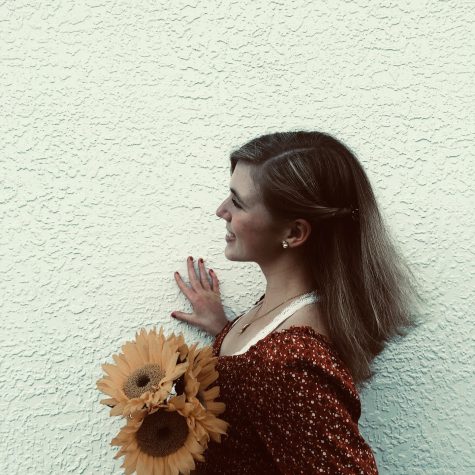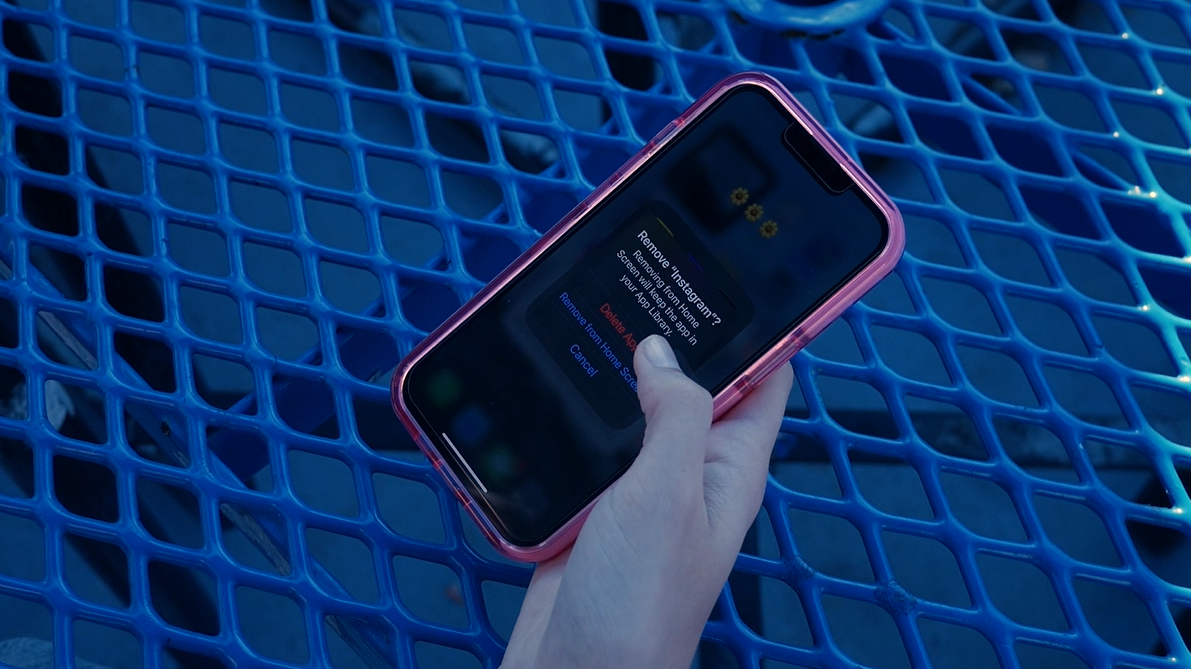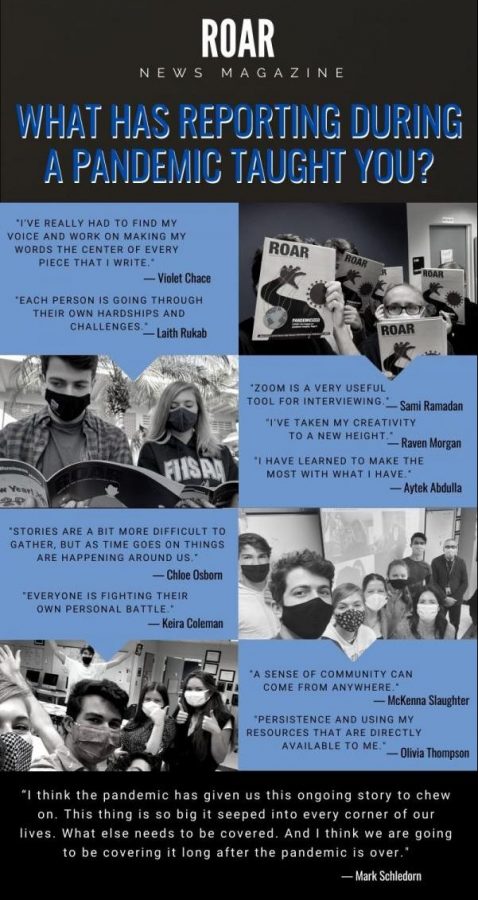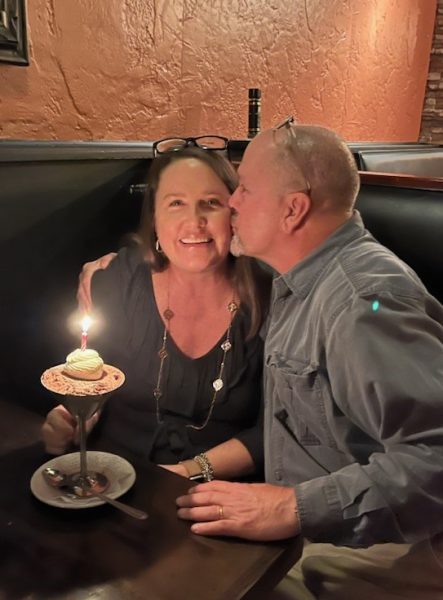LEARNING CURVE: new journalists’ resilience in face of pandemic
Every morning, sophomore Aytek Abdulla sits alone in her bedroom, logged on to the “Roar” news magazine staff’s Google Meet. While she tries to stay optimistic, the digital divide between her and other staff members proved to be disheartening within a pandemic-driven world.
“It can be a bit lonely,” Abdulla said. “I guess I feel less inclined to talk and ask questions when I’m behind the screen, so for the most part it’s just me watching. I want nothing more than to be in that class.”
Abdulla said she has her heart set on entering the next generation of journalists. After completing the Journalism 1 course with her longtime friend, McKenna Slaughter, Abdulla looked forward to working hands-on with a staff of like-minded, hardworking students, to create a news magazine for the student body. But that dream surfaced as a daily routine of logging on to a computer and interacting with the staff through a screen.
“I miss Aytek so much,” Slaughter said. “She’s brilliant and such a highlight of my life. It’s so sad that she’s online because this is something we wanted to do together for so long. We were in Journalism 1 together. This is an experience we were looking forward to since the beginning of our freshman year, and here we are, over halfway through sophomore year, and we have not been able to share it in the way we thought we would.”
For Abdulla, the inability to converse and cooperate with her peers in-person forced her to utilize social media platforms to create an interview base.
“I am a shy person in nature,” Abdulla said. “Talking to people in person was always something that made me nervous. Having the opportunity to talk to people technologically has helped me and made me feel less anxious about talking to people, because it’s really not that scary.”
Slaughter said having e-learners on staff made for a “really weird dynamic,” especially with the digital divide between her and Abdulla.
“I really like to reach out to Aytek for writing advice, because she’s really good at certain aspects of writing that I’m not, and vice versa,” Slaughter said. “We help each other out a lot and it’s way more difficult because I’m in person and she’s online.”
After weeks of reporting, writing and designing, the “Roar” staff released its first issue in November. Not wanting her friend to feel excluded from the excitement, Slaughter drove to Abdulla’s house to hand her a physical copy of the magazine.
“We just sat [in the car] and looked at it and looked through everything,” Slaughter said. “And it was crazy because I was talking to her and it was all of this stuff that I was so familiar with because I was helping design it. I was such a hands-on part of the process. But with the second magazine I was so involved, and then you get it to the e-learners, and it’s all brand new to them.”
The duo’s dream of joining the “Roar” together was finally realized, even if it was in an altered format.
“It was so incredible to see my stories printed, to see my hard work printed,” Abdulla said. “It was also amazing to see my name, written on the byline — spelled correctly, too. When I first saw a copy of the ‘Roar’ magazine back in like seventh grade, I knew I wanted to have my byline printed on this paper. It wasn’t exactly how I expected it to happen, but, nonetheless, it was still magical and McKenna is 10000 percent responsible for that.”
The 10-person staff may be small, but according to Abdulla, that doesn’t matter.
“We have such an amazing staff, and everyone has been so resilient to changes. We’ve had staff members who’ve been quarantined. The most important people, and we’ve gone through and we’ve produced such amazing magazines. It blows my mind. We have such a resilient staff. And it’s also shown how resilient I can be, and how hardworking I can be even in the face of difficulty.”
While Abdulla and McKenna anticipated what awaited them as new reporters in the middle of a pandemic, junior Raven Morgan joined the staff mere minutes before class started on the first day of school.
“I did not have a first period,” Morgan said. “So I went to my guidance counselor in the morning and I said, ‘Where can I go?’ and she said, ‘Well, you’ve taken Journalism 1, and there’s the ‘Roar.’ So I took that.”
While Morgan previously worked on the yearbook staff, and later joined the WCTZ News TV production staff, she said the ‘Roar’ provided a creative outlet she never before fathomed.
“People have more faith in me, and I feel like I have more opportunities,” Morgan said. “I would be doing online school if it weren’t for the ‘Roar.’”
Also among the new eight staff members, is senior Keria Coleman. Former yearbook staff member and West Shore student, Bailey Hetzel, encouraged Coleman to join the yearbook staff.
“I was like, ‘Oh yeah, maybe, I don’t know,’” Coleman said. “Because I had never taken journalism or anything.”
But when the COVID-19 consumed the nation last spring and the world appeared to go into lockdown, one drive over the Eau Gallie causeway changed Coleman’s mind.
“I saw a lady commit suicide off [of a] building,” Coleman said. “I told Bailey and she said, ‘You should write a story on that.’ Say how people are doing with COVID-19 themselves, because there’s a lot going on with mental health issues.”
Coleman got to work writing her first journalistic piece. She interviewed students asking how they were coping with the pandemic. Using their varying perspectives and emotions, she crafted her a story that was soon published to the ‘Roar’ website.”
“After that [Mr. Schledorn] was like, ‘You know, you’re a really good writer,’” Coleman said. “You should absolutely join the newspaper staff.’”
So she did.
“I wanted to put my perspective out there because sometimes there are topics out there that people don’t want to cover, that I would totally be willing to cover,” Coleman said. “Some people are scared to touch on a subject.”
With the school’s transition to block scheduling as a means to curve the spread of COVID-19, Coleman was unable to join the “Roar” staff until the spring semester, due to scheduling conflicts. But she kept writing, and eventually saw her first news magazine story published: a piece featuring student voices all across the country as their communities were under fire from Black Lives Matter protests.
“I feel like if you’re scared to talk about something in particular, think about all of the rest of the people who are scared,” Coleman said. “Someone needs to speak up. Somebody needs to share their story.”
While the “Roar” staff entered the school year prepared to face obstacles, the question loomed as to whether or not printing a news magazine would be possible.
“Money is tight, businesses have been losing dollars and customers every month,” senior Laith Rukab said. “Nothing has gotten back to 100 percent yet.”
Serving as both the managing editor and business manager, Rukab said he worried advertisers would be difficult to come by amid a raging pandemic.
“I thought we were going to have to move this whole operation online,” Rukab said. “I didn’t think we were going to be able to sell a single ad. I’m very blessed and fortunate with what we’ve had this year.”
But the staff succeeded in reaching its goal, accumulating $650 to successfully print a news magazine.
“It proves to be beneficial to get customers back into these businesses,” Rukab said. “I’m just really good at selling ads. It’s that Rukab charm.”
Rukab was one of two returning staff members to the “Roar,” after being staff writer junior year. He said he joined the staff during the 2019-2020 school year, as he was inspired by “a group of students coming together and putting out stories.”
“It’s the life skills,” Rukab said. “These skills that I’ve learned in this class, I really don’t learn in my core classes. This is preparing me for the real world. This has taught me to be self-reliant and how to work with a team.”
This year proved difficult for Rukab, who was quarantined four times due to contact with positive COVID-19 cases. Additionally, the editor in chief was quarantined three times. Both editors were quarantined twice during a deadline.
“I guess all of that has been made harder than it would be otherwise,” Slaughter said. “It’s already difficult because our staff is so new. There’s only two people on staff who have been here before. We’re all trying to adjust to it at once. Only two people know how to use InDesign and they’re both quarainted.”
The staff was caught off guard the first time the editors were quarantined. By round three and four, the number of quarantines almost felt comical.
“It seems like between this staff and WCTZ [News] the most frequently quarantined people are the leaders,” Schledorn said. “I was joking to one of my students the other day, ‘If you don’t want to get quarantined, don’t be a leader on staff. Because it’s the kiss of death.’ Obviously, I don’t think that is true. But it is difficult because of the loyalty the editor in chief and Laith have inspired in their staff, that when you have to go MIA for quarantine.”
Rukab said he tried to stay involved from home, asking questions and staying in the conversation.
“This is my favorite class to come to in the morning,” Rukab said. “It’s why I come to West Shore now. With everything else going on in my life, this is the only thing that keeps me going here. And seeing new staff members come in every day and enjoy this as much as I do, it’s really nice.”
Schledorn said COVID-19 has provided unique opportunities to rising journalists such as Abdulla, Slaughter, Morgan, Keira and Rukab.
“One of the interesting things about journalism is that bad news is rewarding in that we are communicating information to people,” Schledorn said. “That sounds maybe goulish around the edges, but when you have planes hit a world trade center or a pandemic — this is what we do. We are a public trust.”
Watching his students cover a pandemic was not an experience adviser had expected in his 31 years as a publications adviser. But when his 2019-2020 “Roar” staff continued to write from home last spring, when school buildings closed down, Schledorn told his students “this is our opportunity to do what we’re supposed to do as journalists.”
“People from my generation, we went into journalism because of Watergate,” Schledorn said. “Woodward and Bernstein — who at the time were nobody journalists, weren’t high up in the pecking order at the Washington Post, these are two entry level kinds of guys — their reporting resulted in one of the most powerful men in the world resigning from office — and for good reason. And that’s like, ‘Dang, that’s what I want to do.’”
COVID-19 has provided a new twist to every story. According to Schledorn, the staff’s success stems from strong leadership, new reporters with a clear vision of what to write and the fearlessness to ask difficult questions.
“It flows from the top,” Schledorn said. “My editor in chief sets a level of enthusiasm. She’s just going after it all of the time. She’s passionate about changing the status quo. And that’s honestly why I went into journalism.”
Schledorn said the small staff benefits from the committed, like-minded mentality of the group.
“It’s like college football,” Schledorn said. “You’re only as good as your recruits. Alabama wins national championships like every other year, because they have the most talent. It’s not that Nick Saban is the master of all coaches, but he’s the master recruiter of all coaches.”
The 2020-2021 “Roar” staff has faced lows and highs. But through it all, Schledorn said these journalists give him hope for the future.
“I am honestly concerned that we are going to lose a free press in this country in the next 20 years if we don’t pay attention,” Schledorn said. “And I find that terrifying. It’s rare in your generation to have that insight and understand the essential value of journalism to our democracy.”
While Coleman and Rukab look toward college, Abdulla and McKenna hope to reunite in the classroom next school year and Morgan reflects on an unexpected role on staff, the journalists each said the lessons journalism has taught them through a pandemic, will carry on with them.
“It’s almost as if, in some ways, the pandemic has made us more resilient,” Schledorn said. “We’re not going to let this beat us. We’re going to find a way to make this happen.”

This is my third year on the "Roar" staff and my second year as editor in chief. I enjoy covering social and political issues and hope to cover international...

Producer on WCTZ News, officially dubbed the GOAT by Joshua Lopez. Finishing up my fourth year in journalism, and third in TV Production.
I've been...














































